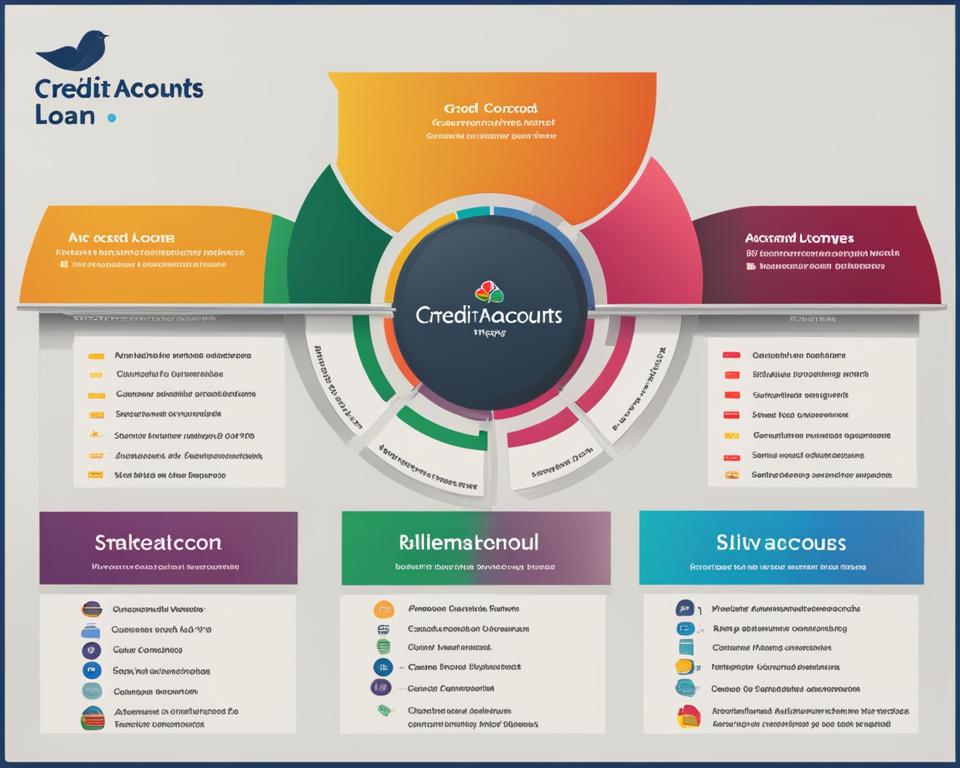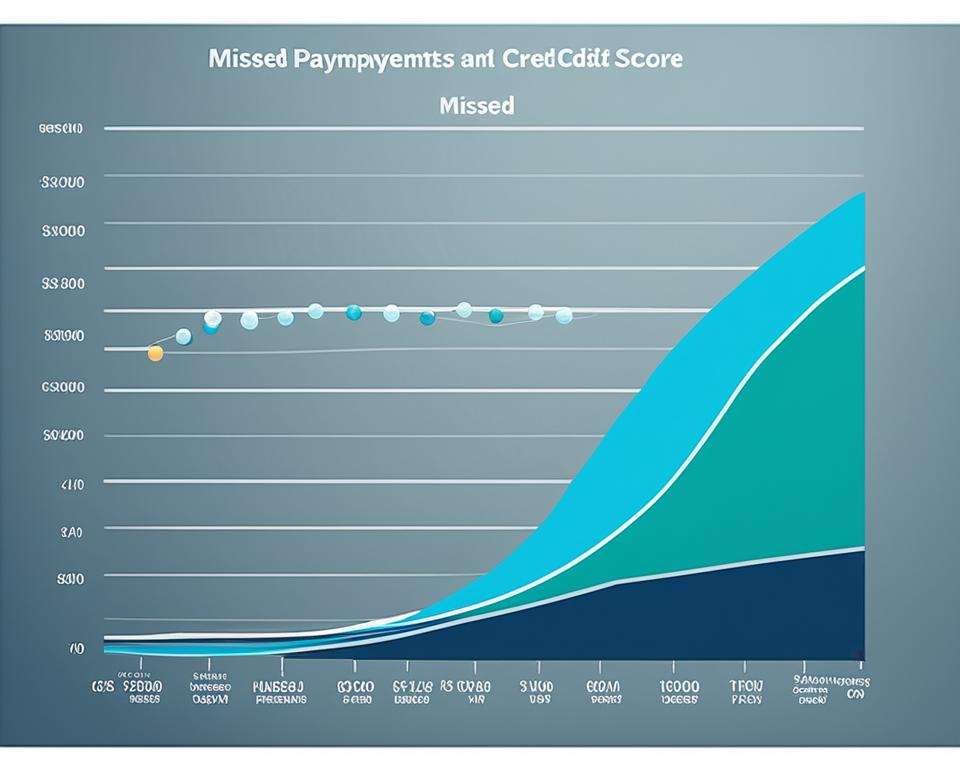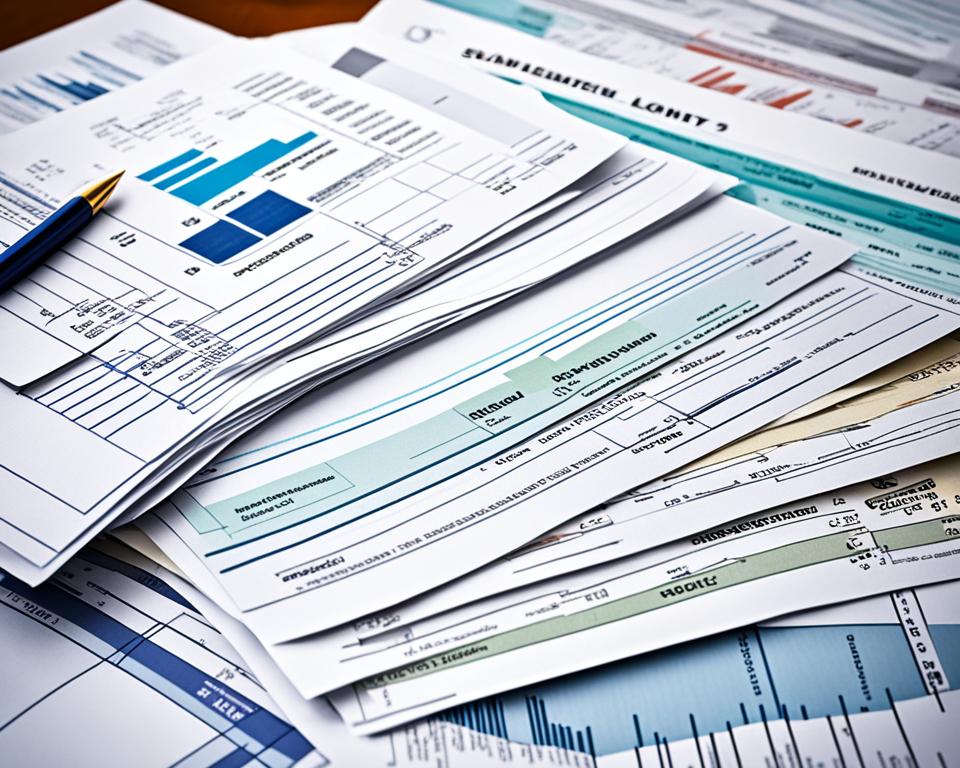When it comes to your financial well-being, understanding how your credit score is calculated is crucial. Your credit score, commonly referred to as a FICO score, plays a significant role in determining your creditworthiness. It is a numeric representation of your credit health and is used by lenders when evaluating your creditworthiness for loans, mortgages, and other financial products.
The credit scoring model, such as the FICO scoring system, generates your credit score based on several factors. These factors include your payment history, amount owed, length of credit history, new credit, and credit mix. Each factor carries a specific weight in the calculation, with payment history being the most influential factor at 35%.
It’s important to note that while FICO is one of the most commonly used credit scoring models, other models may exist as well. Nevertheless, understanding the components of credit score calculation can help you make informed decisions to improve your credit health and overall financial well-being.
Key Takeaways:
- Your credit score is a numerical representation of your creditworthiness.
- The FICO scoring system is one of the most commonly used credit scoring models.
- Payment history, amount owed, length of credit history, new credit, and credit mix are the factors used in credit score calculation.
- Payment history carries the most weight in determining your credit score.
- Understanding credit score calculation can help you improve your financial health.
Payment History
Payment history plays a crucial role in determining your creditworthiness. It accounts for 35% of your overall credit score. Lenders and creditors evaluate how you have managed your payments in the past to assess your creditworthiness.
Your payment history reflects your record of on-time payments, as well as any instances of late payments, delinquencies, collections, or bankruptcies. Making consistent, timely payments demonstrates responsible financial behavior and can positively impact your credit score.
On the other hand, instances of missed or late payments can have a negative effect on your credit score. It’s important to prioritize making payments on time to maintain a positive payment history.
“Your payment history is like a resume for lenders. It showcases your reliability and ability to meet financial obligations.”
Remember, even a single missed payment can have a significant impact on your credit score. It is advisable to set up reminders or automatic payments to avoid unintentional late payments.
By consistently demonstrating good payment habits, you can build a strong payment history and improve your creditworthiness.
| Positive Factors | Negative Factors |
|---|---|
| On-time payments | Late payments |
| Consistent payment behavior | Delinquencies |
| No missed payments | Collections |
| Bankruptcies |
Amount Owed
In determining your credit score, the amount owed on your credit accounts plays a significant role, accounting for 30% of your overall score. This factor considers both the total amount of debt you currently owe and your credit utilization ratio.
Your total amount owed reflects the combined balances on all your credit accounts, including credit cards, loans, and lines of credit. Lenders assess this figure to gauge your level of indebtedness and financial obligations.
The credit utilization ratio, on the other hand, represents the percentage of available credit that you are currently using. It’s calculated by dividing your total credit card balances by your total credit card limits. For example, if you have $2,000 in credit card balances and a total credit limit of $10,000, your credit utilization ratio would be 20%.
Carrying high balances or maxing out your credit cards can have a negative impact on your credit score. It signals to lenders that you may be financially stretched or struggling to manage your debts. On the other hand, keeping your credit utilization below 30% is generally preferred by lenders and can positively affect your score.
It’s important to note that both your total amount owed and your credit utilization ratio are considered when determining your credit score. Managing your debt responsibly, making timely payments, and keeping your balances low can have a significant positive impact on your creditworthiness.
Remember, lenders want to see that you can manage your debts effectively and are not overly reliant on credit. Keeping a healthy balance between the amount owed and your available credit can help maintain a good credit score.
Length of Credit History
The length of your credit history plays a significant role in determining your credit score. It accounts for 15% of the overall calculation, highlighting the importance lenders place on your creditworthiness over time. This factor takes into account the age of your credit accounts and the overall length of your credit history. A longer credit history that demonstrates responsible financial behavior can positively impact your credit rating.
When evaluating your length of credit history, lenders consider the age of your oldest and newest credit accounts, as well as the average age of all your accounts. The longer your accounts have been open and in good standing, the better it is for your credit score.
Why is length of credit history significant? A long and positive credit history signals to lenders that you have a proven track record of managing credit responsibly. It shows that you have successfully navigated through various financial situations and have consistently made timely payments. Lenders typically view a long history of timely payments as a lower risk compared to a short credit history.
Building a solid credit history takes time and patience. If you’re just starting out or have a limited credit history, don’t worry. Establishing new credit accounts and managing them responsibly can gradually improve your credit score over time. It’s important to make on-time payments, keep your credit utilization low, and avoid opening unnecessary new credit accounts.
Remember, your credit history is a reflection of your financial responsibility and creditworthiness. By maintaining a positive credit history, you can increase your chances of obtaining favorable loan terms, lower interest rates, and better financial opportunities in the future.

New Credit
When it comes to your credit score, applying for new credit can have an impact. In fact, it makes up 10% of the credit scoring model’s calculation. It’s important to understand how opening new credit accounts can affect your creditworthiness and overall financial standing.
When you apply for new credit, it sends a signal to lenders that you may be facing potential financial pressures. This can temporarily lower your credit score. It’s crucial to carefully consider whether opening new credit accounts is necessary and if it aligns with your overall financial goals.
Instead of rushing into new credit applications, take the time to evaluate your current financial situation and determine if taking on new credit is the right decision for you. Consider factors such as your ability to manage new debt responsibly, whether it will improve your financial circumstances, and if it aligns with your long-term goals.
| Pros of new credit | Cons of new credit |
|---|---|
|
|
While new credit can offer advantages, it’s important to weigh the potential benefits against the potential drawbacks. Consider consulting with a financial advisor or credit counselor if you are unsure about taking on new credit. They can provide guidance tailored to your specific financial situation.
Credit Mix
The credit mix is an important factor that contributes to your credit score. Lenders prefer to see a diverse range of credit accounts in your financial history. This includes both revolving credit, such as credit cards, and installment credit, such as mortgages or auto loans. Having a mix of different types of credit demonstrates your ability to handle various financial responsibilities, which can positively impact your credit score.
“Having a diverse credit mix shows that you can manage different types of credit effectively.”
Successful management of a credit mix indicates to lenders that you are capable of handling different financial obligations, which can enhance your creditworthiness. It’s important to note that the weight given to credit mix in the credit score algorithm is relatively small, accounting for only 10% of your overall score. However, it still plays a role in the assessment of your creditworthiness.

Types of Credit Accounts
Here is a breakdown of the two main types of credit accounts:
| Type of Credit Account | Description |
|---|---|
| Revolving Credit | Credit accounts that allow you to borrow up to a certain limit. You can choose to pay off the full balance or make minimum payments and carry the remaining balance forward. Examples include credit cards and lines of credit. |
| Installment Credit | Credit accounts with fixed monthly payments and a specific end date for repayment. Examples include mortgages, personal loans, and auto loans. |
Having a combination of these credit accounts can showcase your ability to handle different financial obligations responsibly.
While maintaining a healthy credit mix is important, it’s crucial to prioritize responsible credit management. Ensure that you make payments on time, minimize outstanding debt, and avoid taking on unnecessary credit. By maintaining a diverse credit mix and practicing responsible financial habits, you can improve your credit score and increase your chances of obtaining favorable loan terms in the future.
Credit Score Calculation Exclusions
Your credit score is determined solely based on the information in your credit report. Factors such as your age, income, and employment history are not taken into consideration during the calculation process. The credit scoring models primarily focus on the data contained in your credit report to assess your creditworthiness.
It’s important to note that while your credit report provides a comprehensive overview of your financial behavior, it may not include certain aspects of your payment history. For example, your payment history with utilities or rental payments may not be reported to the credit bureaus and consequently, not included in your credit report.
Therefore, when assessing your creditworthiness, lenders and creditors primarily rely on the information provided in your credit report, which includes factors such as:
- Payment history
- Amount owed
- Length of credit history
- New credit
- Credit mix
To ensure the accuracy of your credit report, it’s highly recommended to review it regularly and report any discrepancies to the credit bureaus. By proactively monitoring your credit report, you can stay informed about your creditworthiness and take appropriate actions to maintain or improve your credit score.
| Credit Score Calculation Inclusions | Credit Score Calculation Exclusions |
|---|---|
| Payment history | Your age |
| Amount owed | Your income |
| Length of credit history | Your employment history |
| New credit | Your payment history with utilities or rental payments |
| Credit mix |
Frequency of Credit Score Calculation
Your credit score is an important measure of your creditworthiness, and it’s crucial to understand how it is calculated. The frequency of credit score calculation is an aspect that many borrowers are curious about. While credit scores are typically updated on a monthly basis, the exact timing can vary depending on several factors.
Lenders report information to credit bureaus, which are responsible for generating credit scores. This information includes details about your payment history, accounts, and other relevant data. Once the credit bureaus receive this information, they use the credit scoring model, such as the FICO scoring system, to calculate your credit score. The scoring model considers various factors in its calculation, as discussed in earlier sections of this article.
To maintain accuracy and reflect recent changes in your financial behavior, lenders typically report updated information to the credit bureaus on a regular basis. In most cases, this updating process occurs monthly. As a result, your credit score is often recalculated monthly.
It’s important to note that credit scores are not fixed numbers and can fluctuate over time. Your credit score can change each month based on the new data provided by lenders. Any updates to your accounts, such as missed payments, new credit applications, or changes in your credit utilization, can impact your credit score.
It’s worth mentioning that the frequency of credit score calculation can vary for different individuals. The timing depends on several factors, including when lenders report information, your billing cycles, and the policies of credit bureaus and scoring models. Some lenders may report information more frequently than others, resulting in more frequent updates to your credit score.
It’s a good practice to regularly monitor your credit score and credit report to stay informed about your financial standing. By doing so, you can address any potential inaccuracies or inconsistencies and take steps to improve your credit score.
Key Points:
- Your credit score is typically calculated and updated on a monthly basis.
- Lenders report information to credit bureaus, which use credit scoring models to calculate credit scores.
- The exact timing of updates may vary depending on factors such as lender reporting practices and billing cycles.
- Credit scores are not fixed and can fluctuate over time based on new information.
- Regularly monitoring your credit score and credit report is essential for maintaining a strong financial position.

Frequency of Credit Score Calculation
| Lender | Credit Score Reporting Frequency |
|---|---|
| Bank A | Monthly |
| Bank B | Bi-monthly |
| Credit Card Company X | Weekly |
| Credit Card Company Y | Monthly |
| Mortgage Lender Z | Quarterly |
Utilities and Credit Scores
When it comes to calculating credit scores, utilities such as cable and phone bills generally do not play a direct role. Unlike factors like payment history and amount owed, utilities are not typically included in the credit score calculation process.
While utility companies may report delinquent accounts to credit bureaus, they typically do not report on-time payments. This means that paying your utility bills on time may not directly impact your credit score.
However, there are certain services, like Experian Boost, that allow you to include your utility payment history in your credit report. By connecting your utility accounts to these services, you can potentially improve your credit profile and increase your credit score.
Using Experian Boost, for example, can help demonstrate your responsible financial behavior by showcasing your on-time utility payments. This additional information can provide lenders with a better understanding of your creditworthiness.
It’s important to note that while including utility payment history in your credit report can be beneficial, it is not guaranteed to have a significant impact on your credit score. The weight given to utility payment history may vary depending on the credit scoring model used by lenders.
Benefits of Including Utility Payments in Your Credit Report
1. Enhanced Credit Profile: Including utility payment history in your credit report provides a more comprehensive view of your creditworthiness.
2. Potential Credit Score Increase: On-time utility payments can potentially boost your credit score by showcasing a positive payment history.
3. Improved Access to Credit: A higher credit score resulting from including utility payments may lead to better access to credit products and lower interest rates.
4. Better Loan Terms: Lenders may be more inclined to offer favorable loan terms based on an improved credit profile.
Although utilities may not be directly factored into credit scores, paying your bills on time remains essential for maintaining good financial health. Timely payments contribute to a positive payment history, which is a critical component of creditworthiness.
| Pros | Cons |
|---|---|
| Opportunity to showcase responsible payment behavior | May not have a significant impact on credit score |
| Can provide a more comprehensive credit profile | Utility payment history weight may vary among credit scoring models |
| Potential for higher credit score and improved access to credit | Service availability may vary by credit reporting agency |
| May lead to better loan terms and lower interest rates | Not all utility providers report payment history to credit bureaus |
Bankruptcies and Credit Scores
Bankruptcies are an important consideration in the computation of credit scores, as they can have a significant negative impact on your credit history for up to 10 years. Lenders view bankruptcies as indicators of financial risk, which can lower your credit score and affect your ability to obtain credit in the future.
When you file for bankruptcy, it becomes a part of your credit report and is factored into credit scoring models. This can result in a significant drop in your credit score, making it more difficult to qualify for loans, credit cards, or other forms of credit. Lenders may see a bankruptcy as a signal of financial instability and may be hesitant to approve new credit applications.
It’s important to understand the long-term effects of bankruptcies on your credit and take steps to rebuild your financial health. Although bankruptcy can have a lasting impact on your credit score, it is not an irreversible situation. Over time, with responsible financial management and good credit habits, you can work towards improving your creditworthiness.
Rebuilding your credit after bankruptcy may involve taking small steps, such as making timely payments on any remaining debts and establishing a positive payment history. It’s also important to keep your credit utilization low, meaning you should try to use a small percentage of your available credit. This can demonstrate to lenders that you are managing your credit responsibly.
While bankruptcies can have a significant impact on your credit score, it’s important to keep in mind that credit scores are not set in stone. With time and responsible financial behaviors, you can rebuild your credit and improve your creditworthiness.
Bankruptcies and Credit Scores – Key Takeaways
- Bankruptcies can have a significant negative impact on your credit history for up to 10 years.
- Lenders view bankruptcies as indicators of financial risk, which can lead to a lower credit score.
- Rebuilding your credit after bankruptcy takes time and requires responsible financial management.
- Establishing a positive payment history and keeping credit utilization low can help improve your creditworthiness.
- Remember, credit scores are not fixed and can be improved with time and positive financial behaviors.
| Bankruptcies and Credit Scores | Key Points |
|---|---|
| Bankruptcies can have a significant negative impact on your credit history. | Up to 10 years |
| Lenders view bankruptcies as indicators of financial risk. | Lower credit score |
| Rebuilding credit after bankruptcy requires responsible financial management. | Timely payments, low credit utilization |
| Positive payment history and low credit utilization can improve creditworthiness. | Improved credit score |
| Credit scores are not fixed and can be improved over time. | With responsible financial behaviors |
This table highlights the key points about bankruptcies and credit scores, emphasizing the impact of bankruptcies on credit history and the importance of responsible financial management for credit rebuilding. It also emphasizes that credit scores are not fixed and can be improved with time and positive financial behaviors.
Multiple Credit Scores
It’s essential to recognize that credit scores may vary across different scoring models, credit bureaus, and data sources. These variations can impact the credit score you receive from different companies and lenders.
When assessing your creditworthiness, lenders and creditors may use different scoring models, such as the FICO scoring system or VantageScore. Each model has its own algorithm and weighting system for evaluating creditworthiness.
Furthermore, credit bureaus, such as Experian, Equifax, and TransUnion, can receive different information from various lenders and creditors, leading to slightly different credit scores. These variations in reporting can result in disparities between credit scores generated by different credit bureaus.
Understanding that there may be multiple credit scores enables you to be aware of potential discrepancies when applying for loans or credit cards. Monitoring your credit reports from different bureaus regularly and addressing any errors or inaccuracies is crucial for maintaining accurate credit scores.
Additionally, it’s important to note that the credit scores provided by free credit monitoring services or online platforms may not be the same as the scores used by lenders.
Comparing Credit Scores from Different Sources
Here is an example table that demonstrates how credit scores can differ across scoring models and credit bureaus:
| Scoring Model | Credit Bureau | Credit Score | |
|---|---|---|---|
| Lender A | FICO | Equifax | 750 |
| Lender B | VantageScore | TransUnion | 720 |
| Lender C | FICO | Experian | 780 |
“It’s important to remember that credit scores are not universal, and they can vary depending on the scoring model and credit bureau used in the evaluation process. When applying for credit or loans, it’s beneficial to focus on maintaining a healthy credit history overall.”
By being aware of the potential variations in credit scores and understanding the factors that contribute to each individual score, you can take steps to maintain a positive credit history. This involves making timely payments, keeping your credit utilization low, and managing your debts responsibly across all of your credit accounts.
While you may have multiple credit scores, proactively managing your credit and ensuring accuracy in your credit reports can help you stay on top of your financial health and make informed decisions when it comes to borrowing and managing credit.
Factors in Credit Scoring Calculations
When it comes to calculating your credit score, credit scoring models take into account several key factors. These factors play a crucial role in determining your creditworthiness and can significantly impact your overall score. Understanding these factors is essential in managing your credit effectively and improving your financial health.
Here are the key factors considered in credit scoring calculations:
Number and Types of Accounts
The number and types of accounts you have can influence your credit score. Having a diverse mix of accounts, such as credit cards, loans, and mortgages, can demonstrate your ability to manage different types of credit responsibly.
Credit Utilization Ratio
Your credit utilization ratio measures the amount of credit you are currently using in relation to your total available credit. Keeping your credit utilization ratio low, ideally below 30%, shows that you are using credit responsibly and can positively impact your credit score.
Length of Credit History
The length of your credit history is another important factor in credit scoring calculations. Generally, a longer credit history indicates a more established financial track record, which can be viewed favorably by lenders.
Payment History
Your payment history is a significant factor in credit scoring calculations. Making timely payments on your credit accounts shows that you are responsible and reliable when it comes to meeting your financial obligations.
Recent Credit Activity
Your recent credit activity, including applications for new credit and any recent credit inquiries, can impact your credit score. Multiple recent credit applications may suggest financial stress, which can negatively affect your score.
Table: Summary of Factors in Credit Scoring Calculations
| Factor | Description |
|---|---|
| Number and Types of Accounts | Diversity of credit accounts and the types of credit you have. |
| Credit Utilization Ratio | The percentage of available credit you are using. |
| Length of Credit History | The age and overall length of your credit accounts. |
| Payment History | Your record of on-time and late payments, collections, and bankruptcies. |
| Recent Credit Activity | New credit applications and recent credit inquiries. |
Each of these factors carries a specific weight in credit scoring calculations. The importance of each factor may vary depending on the credit scoring model being used. Understanding these factors and taking steps to improve them can help you maintain a healthy credit score.
Payment History and Credit Score
Payment history plays a critical role in credit scoring calculations. When lenders and creditors assess your creditworthiness, they carefully evaluate your past credit repayment behavior. The way you handle your payments, including the frequency and timeliness of payments, can significantly impact your credit score. It is crucial to maintain a positive payment history to ensure a good credit score.
Late payments, missed payments, bankruptcies, and collections can have a negative impact on your credit score. These negative payment incidents can stay on your credit report for several years, making it harder to access credit or obtain favorable loan terms in the future. On the other hand, building a history of on-time payments demonstrates responsible financial behavior and can help you maintain a good credit score.
When making credit decisions, lenders and creditors want to minimize their risk. By examining your payment history, they can determine your creditworthiness, assessing the likelihood of you repaying debts responsibly. Consistently making payments on time indicates a lower risk, making it easier for you to access credit at favorable terms and rates.
“Payment history is the foundation of your creditworthiness. It’s crucial to stay current on all your financial obligations to maintain a good credit score.”
Building a positive payment history requires consistently meeting your financial obligations by making payments on time. This applies to credit card bills, loan repayments, mortgages, and any other debts you have. It’s recommended to set up automatic payments or reminders to ensure you never miss a payment. By doing so, you establish a reputation as a reliable borrower and increase your chances of obtaining credit in the future.
Furthermore, it’s important to remember that credit scores are not fixed numbers. They can fluctuate over time based on your financial behavior and payment history. Maintaining a positive payment history is a crucial aspect of managing your creditworthiness and ensuring a healthy financial profile.

Factors Impacting Payment History and Credit Score
| Factors Affecting Payment History | Impact on Credit Score |
|---|---|
| On-time payments | Positive impact |
| Late or missed payments | Negative impact |
| Bankruptcies and collections | Significant negative impact |
| Consistent payment history | Positive impact |
As seen in the table above, making on-time payments and maintaining a consistent payment history can have a positive impact on your credit score. Conversely, late or missed payments, as well as bankruptcy and collections, can significantly damage your credit score. It’s crucial to prioritize timely payments and demonstrate responsible financial behavior to ensure a good credit score.
Used Credit vs. Available Credit
When it comes to calculating your credit score, one important factor that credit scoring models consider is the ratio of used credit versus available credit. This ratio, known as credit utilization, plays a crucial role in determining your creditworthiness and overall credit score computation.
Maxing out your credit cards or carrying high balances can have a negative impact on your credit score. Lenders view this as a sign of potential financial strain and may perceive it as a risk factor, which can lower your creditworthiness in their eyes. It’s important to keep your credit utilization ratio as low as possible to maintain a healthy credit score.
For optimal credit health, it is generally recommended to keep your credit utilization below 30%. This means that you should aim to use no more than 30% of the total credit available to you. By doing so, you show creditors that you can responsibly manage your credit and that you are not overly reliant on borrowed funds.
Managing your credit wisely and keeping your credit utilization low demonstrates financial responsibility and can positively impact your credit score. Maintaining a healthy credit utilization ratio is just one piece of the puzzle when it comes to building and maintaining a good credit score.
| Benefits of Low Credit Utilization | Drawbacks of High Credit Utilization |
|---|---|
| 1. Higher credit score | 1. Lower credit score |
| 2. Increased likelihood of loan approvals | 2. Decreased likelihood of loan approvals |
| 3. Access to better interest rates and terms | 3. Limited access to favorable interest rates and terms |
| 4. Improved overall financial health | 4. Potential financial strain |
Evaluating Your Credit Utilization
To determine your credit utilization ratio, you’ll need to calculate the total amount of credit you are currently using compared to your total available credit. You can find this information on your credit card statements or by logging into your online banking accounts.
To illustrate this concept, let’s consider an example:
John has a total credit limit of $10,000 across all his credit cards. Currently, his outstanding balances amount to $3,000. To calculate his credit utilization ratio, John would divide his total outstanding balances ($3,000) by his total credit limit ($10,000), resulting in a credit utilization ratio of 30%.
It’s important to note that credit utilization is calculated based on revolving credit accounts, such as credit cards, and not on installment loans like mortgages or auto loans.
A good rule of thumb is to regularly monitor your credit utilization and make adjustments as necessary to keep it within the recommended range. By being mindful of your credit usage and maintaining a low credit utilization, you can enhance your creditworthiness and increase your chances of obtaining favorable credit offers in the future.
Conclusion
Understanding how your credit score is calculated is essential for managing your financial health. By focusing on factors such as payment history, amount owed, length of credit history, new credit, and credit mix, you can take steps to improve your credit score and enhance your financial well-being.
A good credit score opens the door to better financial opportunities and options. It helps you secure favorable interest rates on loans, obtain credit cards with attractive rewards, and even qualify for rental applications or mortgage approvals.
To maintain a healthy credit score, it is important to regularly review your credit report for accuracy and address any potential inaccuracies. Consider utilizing credit monitoring services and take necessary actions to correct any errors. Additionally, practice responsible credit management by making payments on time, keeping your credit utilization low, and avoiding excessive debt.
Remember, a good credit score is an asset that can benefit you throughout your financial journey. Take control of your credit score calculation and pave the way for a more secure financial future.
FAQ
How is a credit score calculated?
A credit score is calculated using factors such as payment history, amount owed, length of credit history, new credit, and credit mix. These factors are assigned weights in the scoring model, with payment history being the most influential. Different credit scoring models may have slight variations in their calculations.
What is payment history, and how does it impact credit scores?
Payment history refers to your record of on-time payments, late payments, delinquencies, collections, or bankruptcies. It accounts for 35% of your credit score calculation. Consistently making payments on time improves your credit score, while payment issues can lower it.
How does the amount owed affect credit scores?
The amount owed on your credit accounts makes up 30% of your credit score calculation. It considers your total debt and credit utilization ratio. Carrying high balances or maxing out credit cards can negatively impact your score, while keeping credit utilization below 30% is preferred.
What role does the length of credit history play in credit scores?
The length of credit history contributes 15% to your credit score. It considers the age of your credit accounts and overall credit history. A longer history of timely payments is viewed as less risky by lenders, positively impacting your score.
How does new credit affect credit scores?
New credit makes up 10% of the credit score calculation. Applying for new credit can temporarily lower your score as it indicates potential financial pressures. It’s important to carefully consider new credit accounts and their alignment with your financial goals.
What is credit mix, and how does it impact credit scores?
Credit mix accounts for 10% of your credit score. Lenders prefer to see a diverse mix of credit accounts, such as credit cards and mortgages. Successfully managing different types of credit demonstrates financial responsibility and positively impacts your score.
What factors are not considered in credit score calculations?
Factors such as age, income, and employment history are not included in credit score calculations. Additionally, payment history with utilities or rental payments may not be included in your credit report. Checking your credit report regularly for accuracy is important.
How often are credit scores calculated and updated?
Credit scores are generally calculated and updated monthly as lenders report information to credit bureaus regularly. However, the frequency of updates can vary. It’s important to note that credit scores are not fixed numbers and can fluctuate over time.
Are utilities included in credit score calculations?
Utilities like cable and phone bills are generally not included in credit score calculations. While delinquent accounts may be reported, on-time utility payments are typically not reported. However, services like Experian Boost can include utility payment history in your credit report.
How do bankruptcies affect credit scores?
Bankruptcies are considered in credit score calculations and can have a significant negative impact for up to 10 years. Lenders view bankruptcies as indicators of financial risk, which can lower your credit score. Rebuilding your financial health after bankruptcy is important.
Can a person have multiple credit scores?
Yes, a person can have multiple credit scores. Credit scores can vary due to factors such as the credit scoring model used, the data on which the score is based, and the company providing the score. Different credit bureaus may generate slightly different credit scores.
What factors are considered in credit scoring calculations?
Credit scoring calculations consider factors like the number and types of accounts, credit utilization ratio, length of credit history, payment history, and recent credit activity. Each factor carries a certain weight in the calculation, which may vary depending on the scoring model used.
How does payment history impact credit scores?
Payment history plays a critical role in credit scoring calculations. Lenders assess past credit repayment behavior to determine creditworthiness. Late payments, missed payments, bankruptcies, and collections can lower credit scores. Building a history of on-time payments is crucial for a good credit score.
What role does used credit versus available credit play in credit scores?
Credit scoring models consider the ratio of used credit versus available credit. Maxing out credit cards or carrying high balances can lower your credit score. It’s recommended to keep your credit utilization below 30% to maintain a healthy credit score.
How can understanding credit score calculation help with financial health?
Understanding how your credit score is calculated is essential for managing your financial health. By focusing on factors such as payment history, amount owed, length of credit history, new credit, and credit mix, you can take steps to improve your credit score. Regularly reviewing your credit report and making responsible credit decisions is important for maintaining a good credit score.





